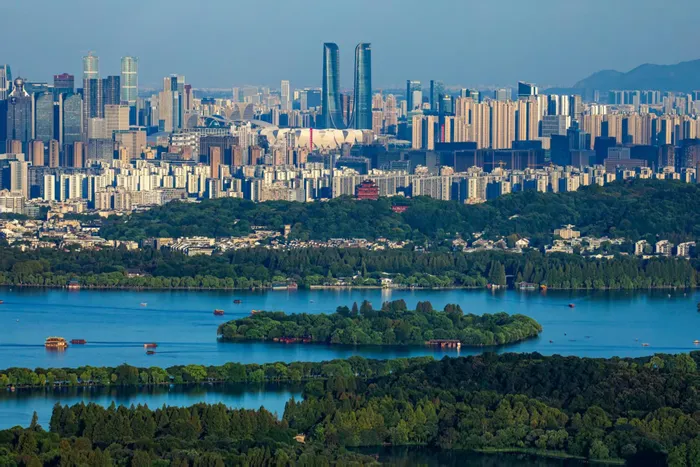Hangzhou’s way of development governance: how a G20 host city turns ideas into reality

Walking in Hangzhou, there are leisurely rivers of the Qiantang River on one side and sparkling architectural landmarks on the other.
Image: Xinhua
As the 20th G20 Leaders’ Summit convened in Johannesburg, South Africa, from November 22 to 23, the world turns its attention to economic governance in an era of transformation. Half a world away, Hangzhou, China’s former G20 host city, has taken concrete actions to pioneer a “united, equitable, and sustainable” model of economic and social governance, offering a vivid answer to the summit’s guiding principles.
Back in 2016, the 11th G20 Leaders’ Summit was held in Hangzhou, capital of China’s Zhejiang Province. The “Hangzhou Consensus,” advocating for long-term vision, comprehensive policies, expanded opening-up, and inclusive development, was enshrined in the global economic governance agenda.
Nine years on, this oriental metropolis has translated the written consensus into tangible development outcomes through breakthroughs in the digital economy, expanded opening-up, surging innovation momentum, and efforts toward common prosperity, providing a living example from China for the ideals championed at this year’s G20 Summit.
The G20’s call for unity finds tangible expression in Hangzhou’s practices, with city-to-city exchange platforms like the Hangzhou International Day serving as bridges for global cooperation.
Since designating September 5 as Hangzhou International Day in 2018, the city has leveraged cultural performances, industrial matchmaking, academic seminars, and youth exchanges to create a landmark window for dialogue and win-win cooperation with the world. Today, Hangzhou maintains sister-city relationships with 31 international cities and friendly exchange ties with 50 others, forming a global network spanning all six continents.
More notably, Hangzhou has extended unity beyond cultural exchange to industrial cooperation. As the permanent home of the secretariat of the Belt and Road Initiative (BRI) local cooperation committee, the city has established economic and trade links with over 200 countries and regions worldwide. These platforms foster greater connectivity between cities, and such connections ultimately converge into a driving force for global cooperation.
The G20’s emphasis on equity embodies the profound meaning of ensuring development benefits all, a goal closely aligned with Hangzhou’s pursuit of common prosperity.
As a key pilot area for China’s rural revitalization initiative called Green Rural Revival Program, Hangzhou recorded a per capita disposable income of 50,805 yuan (about 7,000 U.S. dollars) for rural residents in 2024, with the urban-rural income gap narrowing to 1.64:1. This places the city among China’s leaders in balanced urban-rural development.
In advancing rural revitalization, Hangzhou has pioneered a model of leveraging key villages to drive regional development, harnessing digital technology to empower agriculture. Meanwhile, reforms such as mutual recognition of medical test results have eliminated redundant examinations, the “shared teacher” program promotes educational equity, and senior meal assistance services cover all towns and townships. These details reflect Hangzhou’s core belief: sustainable development must ultimately center on people’s well-being.
For Hangzhou, the cornerstone of an economy’s sustainable development lies in scientific and technological innovation, which provides vitality and momentum for growth.
After hosting the 2016 G20 Summit, Hangzhou refused to rest on its laurels as the country’s e-commerce hub. Instead, it transformed the innovative dynamism accumulated in the internet sector into a digital engine for upgrading the real economy. Today, the added value of the city’s core digital economy industries accounts for nearly 30% of its GDP, with emerging industrial clusters in smart IoT and biomedicine thriving.
Hangzhou has built a diverse and multi-dimensional matrix of high-level sci-tech innovation platforms. Its investment in research and development (R&D) accounts for 3.9% of its GDP, and it boasts 146.1 invention patents per 10,000 people—far exceeding the national average. Recently, the World Intellectual Property Organization (WIPO) ranked Hangzhou’s innovation cluster 13th globally in its 2025 Global Innovation Index (GII), a historic high.
From DeepSeek’s rise as a global leader in large language models to Yushu Technology’s recognition with WIPO Global Awards, Hangzhou’s technological breakthroughs demonstrate that innovation is not an isolated laboratory achievement, but a core driver that can take root, drive industrial upgrading, and sustain economic growth.
Over nine years, Hangzhou has activated innovation through the digital economy, embraced the world with an open mindset, nurtured momentum through an innovative ecosystem, and warmed hearts through common prosperity.
It has not only transformed itself from an e-commerce hub to a star sci-tech city, but also proven to the world that development is not a race defined by single indicators or zero-sum games. Instead, it is a systematic project built on win-win cooperation, balancing speed with compassion, and efficiency with equity.
Hailed by Marco Polo as “the most beautiful and magnificent city,” Hangzhou is now offering a replicable and scalable Chinese model for high-quality development to economies worldwide.